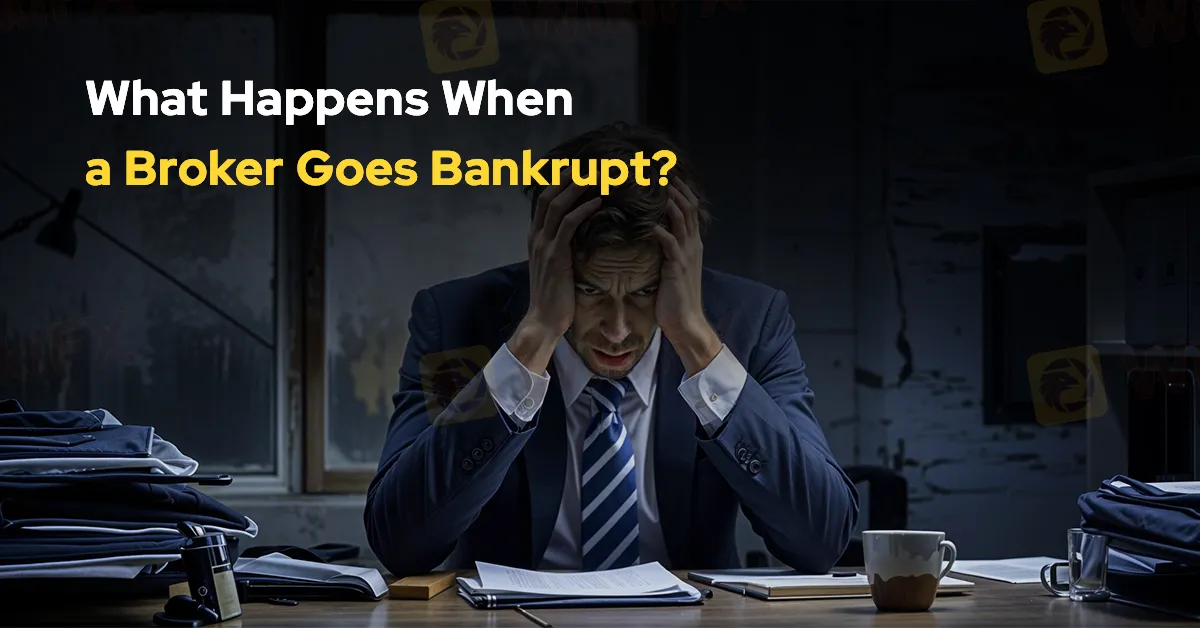简体中文
繁體中文
English
Pусский
日本語
ภาษาไทย
Tiếng Việt
Bahasa Indonesia
Español
हिन्दी
Filippiiniläinen
Français
Deutsch
Português
Türkçe
한국어
العربية
What Happens When a Broker Goes Bankrupt?
Abstract:Many trust brokers to hold their funds securely and facilitate their trades. However, when a broker collapses, the situation can become uncertain. Knowing what happens in such cases can help traders prepare and reduce potential losses.

The thought of a broker going bankrupt can be terrifying for traders. Many trust brokers to hold their funds securely and facilitate their trades. However, when a broker collapses, the situation can become uncertain. Knowing what happens in such cases can help traders prepare and reduce potential losses.
When a broker declares bankruptcy, the first concern is client funds. In many countries, brokers must keep client funds in segregated accounts. These accounts are separate from the broker‘s operational funds. This requirement ensures that client money is protected if the broker’s finances fail. However, not all brokers follow this rule, especially those operating in poorly regulated regions.
Regulators play a key role in managing broker insolvencies. In well-regulated markets, authorities step in to oversee the process. For example, in the UK, the Financial Conduct Authority (FCA) ensures that client funds are returned as a priority. Compensation schemes like the Financial Services Compensation Scheme (FSCS) also exist to protect clients. Under the FSCS, traders may receive compensation up to a certain limit if their broker fails.
In poorly regulated markets, the situation is more complex. Traders may struggle to recover funds. Brokers in these regions often lack safeguards like segregated accounts or compensation schemes. Without proper regulation, clients are left exposed to greater risks.

Another factor is whether the broker offers negative balance protection. If a trader‘s account balance goes negative during a broker’s financial trouble, it can complicate the claims process. Brokers offering this protection absorb client losses, but those that do not may hold traders responsible for debts.
The bankruptcy process can be lengthy. Administrators are appointed to assess the broker‘s finances and liabilities. They prioritise claims based on local laws and regulations. Traders must file claims to recover their funds. Depending on the broker’s financial health, recovery can take months or even years.
Fraudulent brokers present additional challenges. Some brokers declare bankruptcy to avoid paying clients. These cases often involve legal battles. Authorities must determine whether the broker acted in bad faith. Clients of fraudulent brokers may face greater difficulty in recovering their money.
To reduce risks, traders should choose brokers with strong regulatory oversight. Brokers regulated by authorities like the FCA or the Australian Securities and Investments Commission (ASIC) provide greater security. Always check if a broker holds client funds in segregated accounts. Researching a brokers financial stability is also important.
Broker bankruptcy is rare, but it is not impossible. Traders must remain vigilant and informed to safeguard their investments. Download the free WikiFX mobile application to conduct due diligence effortlessly.

Disclaimer:
The views in this article only represent the author's personal views, and do not constitute investment advice on this platform. This platform does not guarantee the accuracy, completeness and timeliness of the information in the article, and will not be liable for any loss caused by the use of or reliance on the information in the article.
Read more

Oanda Shines As Frop Trading Firm After Being Acquired By FTMO
FTMO enhances prop trading with the OANDA Prop Trader Community and loyalty program, integrating CRM automation and rewards post-acquisition.

Webull: A Comprehensive Review from Accounts to Withdrawal 2025
Webull Financial stands as a digital trading platform founded in 2017, offering commission-free trading across multiple asset classes including stocks, options, ETFs, cryptocurrencies, and forex. The platform targets primarily intermediate traders seeking a balance of analytical tools and straightforward execution capabilities. While Webull provides robust charting tools and an intuitive mobile experience, its forex offering remains at industry average levels with certain limitations in currency pair selection compared to some other forex brokers.
Quotex Review 2025:Live & Demo Accounts, Withdrawal to Explore
Quotex is an online trading platform specializing in digital options, offering access to various assets, including currencies, commodities, and cryptocurrencies. It operates with a proprietary web-based platform. The platform's user interface, while basic, is generally functional, and the availability of numerous short-term trading options may appeal to those seeking rapid trading opportunities. While it presents a user-friendly interface and a low minimum deposit, it's important to note that the regulatory landscape surrounding Quotex involves offshore registration, which may present different levels of investor protection compared to more strictly regulated financial jurisdictions.

Malaysian Vendor Falls Victim to Forex Scam, Losing RM500K in Life Savings
A Malaysian night market vendor has lost RM500,000 which is the entirety of his and his wife’s life savings after falling prey to a fraudulent foreign exchange investment scheme registered in Seychelles, East Africa.
WikiFX Broker
Latest News
Brazilian Man Charged in $290 Million Crypto Ponzi Scheme Affecting 126,000 Investors
Become a Full-Time FX Trader in 6 Simple Steps
ATFX Enhances Trading Platform with BlackArrow Integration
Decade-Long FX Scheme Unravels: Victims Lose Over RM48 Mil
The Top 5 Hidden Dangers of AI in Forex and Crypto Trading
5 Steps to Empower Investors' Trading
How to Find the Perfect Broker for Your Trading Journey?
The Most Effective Technical Indicators for Forex Trading
What Can Expert Advisors Offer and Risk in Forex Trading?
Indian National Scams Rs. 600 Crore with Fake Crypto Website
Currency Calculator






